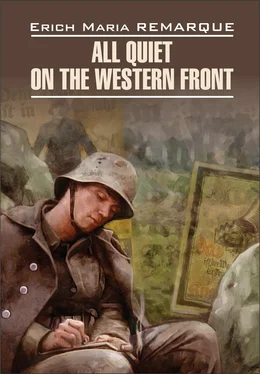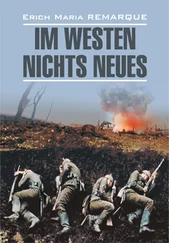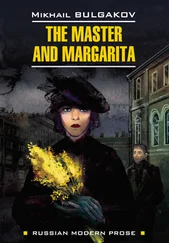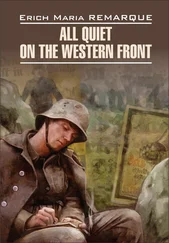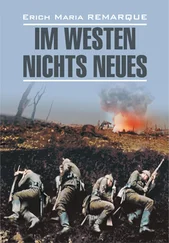Kropp asks, ‘Have any of you seen Kemmerich again?’
‘He’s over at St Joseph,’ I say.
Muller reckons that he got one right through the thigh [28] one right through the thigh – сквозное ранение правого бедра
, a decent blighty wound [29] blighty wound – ранение, обеспечивающее отправку на родину
.
We decide to go and see him that afternoon.
Kropp pulls out a letter. ‘Kantorek sends his regards.’
We laugh. Muller tosses his cigarette away and says, ‘I wish he was out here.’
Kantorek was our form-master at school, a short, strict man who wore a grey frock-coat and had a shrewish face. He was roughly the same size and shape as Corporal Himmelstoss, the ‘terror of Klosterberg Barracks’. Incidentally, it’s funny how often the miseries of this world are caused by short people – they are so much more quick-tempered and difficult to get on with than tall ones. I have always tried to avoid landing up in companies with commanders who are short – usually they are complete bastards.
Kantorek kept on lecturing at us in the PT lessons until the entire class marched under his leadership down to the local recruiting office and enlisted. I can still see him, his eyes shining at us through his spectacles and his voice trembling with emotion as he asked, ‘You’ll all go, won’t you lads?’
Schoolmasters always seem to keep their sentiments handy in their waistcoat pockets; after all, they have to trot them out in lesson after lesson. But that never occurred to us for a moment at the time.
In fact, one of our class was reluctant, and didn’t really want to go with us. That was Josef Behm, a tubby, cheerful chap. But in the end he let himself be persuaded, because he would have made things impossible for himself by not going. Maybe others felt the same way as he did; but it wasn’t easy to stay out of it because at that time even our parents used the word ‘coward’ at the drop of a hat. People simply didn’t have the slightest idea of what was coming. As a matter of fact it was the poorest and simplest people who were the most sensible; they saw the war as a disaster right from the start, whereas those who were better off were overjoyed about it, although they of all people should have been in a far better position to see the implications.
Katczinsky says it is all to do with education – it softens the brain. And if Kat says something, then he has given it some thought.
Oddly enough, Behm was one of the first to be killed. He was shot in the eye during an attack, and we left him for dead. We couldn’t take him with us because we had to get back in a great rush ourselves. That afternoon we suddenly heard him shout out and saw him crawling around in no man’s land. He had only been knocked unconscious. Because he couldn’t see and was mad with pain he didn’t take cover, so he was shot down from the other side before anyone could get out to fetch him.
That can’t be linked directly with Kantorek, of course – where would we be if that counted as actual guilt? Anyway, there were thousands of Kantoreks, all of them convinced that they were acting for the best, in the way that was the most comfortable for themselves.
But as far as we are concerned, that is the very root of their moral bankruptcy.
They were supposed to be the ones who would help us eighteen-year-olds to make the transition, who would guide us into adult life, into a world of work, of responsibilities, of civilized behaviour and progress – into the future. Quite often we ridiculed them and played tricks on them, but basically we believed in them. In our minds the idea of authority – which is what they represented – implied deeper insights and a more humane wisdom. But the first dead man that we saw shattered this conviction. We were forced to recognize that our generation was more honourable than theirs; they only had the advantage of us in phrase-making and in cleverness. Our first experience of heavy artillery fire showed us our mistake, and the view of life that their teaching had given us fell to pieces under that bombardment.
While they went on writing and making speeches, we saw field hospitals and men dying: while they preached the service of the state as the greatest thing, we already knew that the fear of death is even greater. This didn’t make us into rebels or deserters, or turn us into cowards – and they were more than ready to use all of those words – because we loved our country just as much as they did, and so we went bravely into every attack. But now we were able to distinguish things clearly, all at once our eyes had been opened. And we saw that there was nothing left of their world. Suddenly we found ourselves horribly alone – and we had to come to terms with it alone as well.
Before we set off to see Kemmerich we pack his things up for him – he’ll be glad of them on his way home.
The clearing station [30] clearing station – эвакуационный пункт
is very busy. It smells of carbolic, pus and sweat, just like it always does. You get used to a lot of things when you are in the barracks, but this can still really turn your stomach. We keep on asking people until we find out where Kemmerich is; he is in a long ward, and welcomes us weakly, with a look that is part pleasure and part helpless agitation. While he was unconscious, somebody stole his watch.
Muller shakes his head, ‘I always said that you shouldn’t take such a good watch with you, didn’t I?’
Muller is a bit bossy and tactless. Otherwise he would have kept his mouth shut, because it is obvious to everyone that Kemmerich is never going to leave this room. It makes no difference whether he gets his watch back or not – the most it would mean is that we could send it back home for him.
‘How’s it going, then, Franz?’ asks Kropp.
Kemmerich’s head drops back. ‘OK, I suppose. It’s just that my damned foot hurts so much.’
We glance at his bed-cover. His leg is under a wire frame, which makes the coverlet bulge upwards. I kick Muller on the shin, because he would be quite capable of telling Kemmerich what the orderly told us before we came in; Kemmerich no longer has a foot. His leg has been amputated.
He looks terrible, yellow and pallid, and his face already has those weird lines that we are so familiar with because we have seen them a hundred times before. They aren’t really lines at all, just signs. There is no longer any life pulsing under his skin – it has been forced out already to the very edges of his body, and death is working its way through him, moving outwards from the centre, it is already in his eyes. There in the bed is our pal Kemmerich, who was frying horse-meat with us not long ago, and squatting with us in a shell hole [31] shell hole – воронка от снаряда
– it’s still him, but it isn’t really him any more; his image has faded, become blurred, like a photographic plate that’s had too many copies made from it. Even his voice sounds like ashes.
I remember the day when we were drafted out [32] we were drafted out – мы отправились на фронт
. His mother, a pleasant, stout woman, saw him off at the station. She was crying all the time, and her face was puffy and swollen. This embarrassed Kemmerich, because she was the least composed of all of them, practically dissolving in fat and tears. What’s more, she picked me out, and kept grabbing my arm and begging me to keep an eye on Franz when we got out here. As it happens, he did have a very young face, and his bones were so soft that after just a month of carrying a pack he got flat feet [33] flat feet – плоскостопие
. But how can you keep an eye on someone on a battlefield?
Читать дальше
Конец ознакомительного отрывка
Купить книгу
